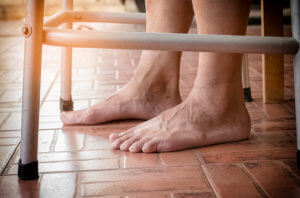Tips for Using Exercise to Ease Restless Legs Syndrome
If you’re aging loved one is one of the millions of people throughout the United States who are currently living with restless leg syndrome, you know how much this nerve condition can impact their functioning and quality of life. As a family caregiver, you want to help them find as many ways as possible to manage these symptoms and improve their condition. One of the most effective and most accessible ways to do this is with exercise. Staying physically active is important to the health and well-being of all people, but those who are living with restless leg syndrome often find that exercising reduces the frequency of their symptoms, the severity of their symptoms, and the negative impact the symptoms have on the rest of their life.

Senior Care in Foley AL: Restless Legs Syndrome
Use these tips to encourage your aging parent to use exercise to ease their restless leg syndrome symptoms:
Exercise regularly. Staying active on a daily basis is an important part of maintaining all aspects of health, but if your parent is dealing with RLS, regular exercise can help to keep their symptoms at a minimum. Exercising daily can help your parent to fall asleep more easily, and sleep more deeply, which reduces the instance of RLS symptoms
Focus on stretching. Encourage your parent to stretch their leg muscles in the morning and before bed. This can relax the muscles and relieve tension that soothes the nerves for less, and less intense symptoms. Talk to your parent’s doctor about stretching to find out what kinds of stretches, and how much stretching, is safe for your senior
Don’t exercise too close to bedtime. Stretching before bed can help to relax your parent, but pushing too much can stimulate the mind and body. This can not only make it harder for your parent to sleep but can increase the risk of RLS symptoms
Move when they need to. The urge to move around can be very frustrating, and your parent might think that ignoring it or trying to fight it might “train” their brain to stop feeling the compulsion. This is not the case. If your parent feels the urge to move, they should go with it. Walking around for a few minutes, or even just wiggling their legs around, can ease the sensations and help them relax.
Staying physically active it is important for all people to maintain health and well-being. Exercising is not just about maintaining a healthy weight, supporting balance, or strengthening the joints and muscles, though all of these are vital benefits. Getting enough exercise can also help to support better mental and emotional health for your senior, encouraging overall better well-being and quality of life.
When your senior is dealing with health complications such as restless leg syndrome, physical activity takes an even greater importance. Integrating elder care into your usual care routine for your senior is a great way to help them to maintain a more active lifestyle.
An elderly home care services provider can provide physical support and assistance to help your parent cope with mobility issues, provide transportation that will bring them to different locations for exercise such as a community center or park, and encourage your parent to engage in activities they enjoy more often. This will help you or a loved one to experience the wide-reaching benefits of physical activity and give you greater confidence that they are doing everything they need to maintain their health throughout their later years.
If you or someone you know needs Senior Care in Foley, AL, please contact the friendly caregivers at Hughes Home Care. We provide quality and affordable care for your elderly loved ones in our community. Call Us Today 251-517-9901. Serving Mobile & Baldwin County.
Source:
- Risk Factors that Increase the Likelihood of Heart Failure - April 11, 2025
- Is it Possible for Seniors to Eat 30 Plants a Week? - March 25, 2025
- Healthy Aging: Why Remaining Active Matters - March 7, 2025
